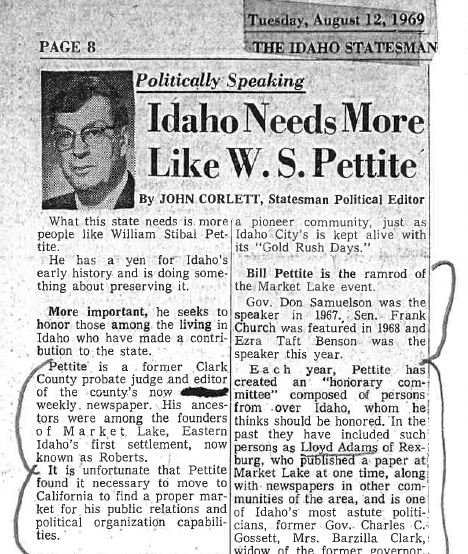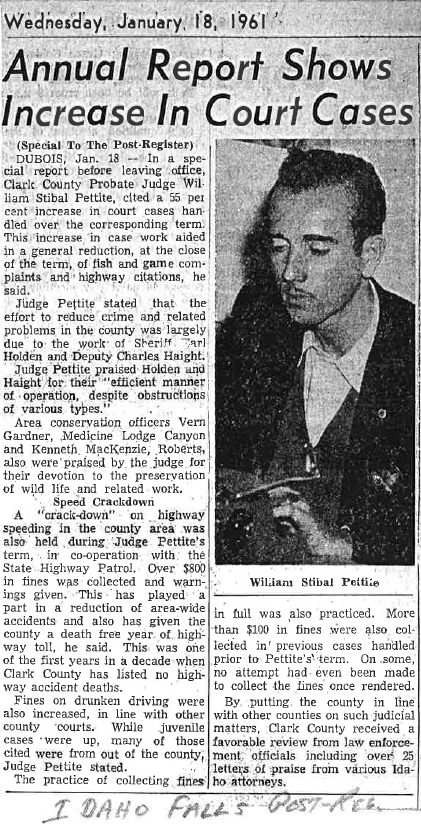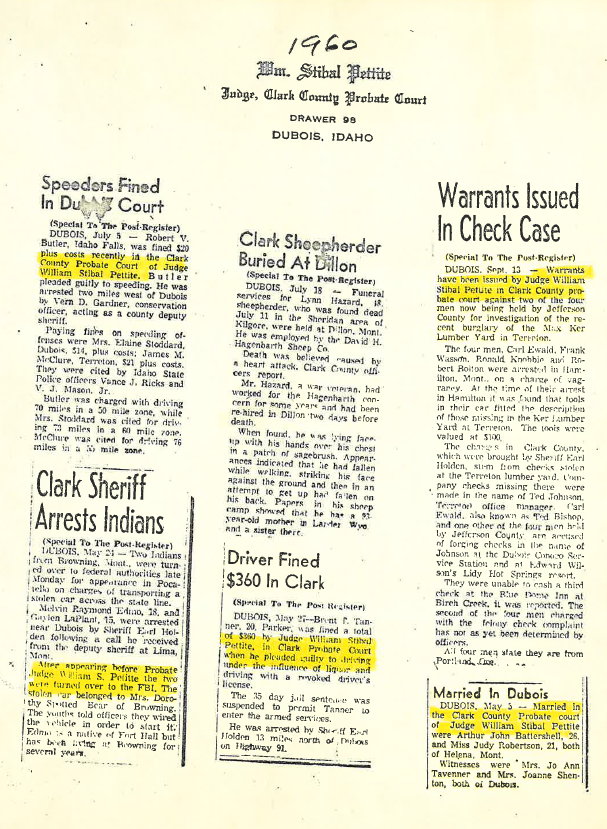Reminiscences of a Probate Judge by Hon. Michael J. Oths and John S. McGown, Jr.

Authors’ Note: William Pettite was the Probate Judge in Clark County, Idaho over 60 years ago. Now 87, he was kind enough recently to share his recollection of that experience with Judge Oths.
Judge Roy Bean was “The Law West of the Pecos” when he took the bench in Southwest Texas in 1882. While there is no record that judges in Dubois, Idaho have ever been referred to as “The Law West of the Tetons” or “The Law West of St. Anthony” there certainly must be similarities that apply to serving in small communities.
In that same year of 1882, the first-ever Justice of the Peace in nearby Market Lake (now Roberts[i]), James Daggett, was arrested for cattle rustling and was convicted of grand larceny. Because he was a prominent community member, he had been released on his own recognizance. Given a few days to get his affairs in order, Judge Daggett absconded to Montana and apparently never returned.[ii]
Until 1970 court reorganization consolidated all lower trial courts into the Magistrate Division, Idaho maintained a variety of local courts, including probate court, police court, and justice court. Most of those judges were non-lawyers.
In 1959, when Bill Pettite sought appointment as Probate Judge in Dubois, he understood the need to have connections. He had grown up in nearby Roberts and formally applied as William Stibal Pettite. The middle name was important because the Stibal family had been prominent in the area for several generations. Bill’s grandfather, William Stibal, arrived in Market Lake in 1895, only three years after the town was founded. The elder Stibal was a prominent merchant, rancher, and banker, among many other things.
Bill Pettite was only around 23 years old at the time of his application, a fact that may have “inadvertently” been omitted during the vetting process.[iii] Although only a young man, Pettite owned two weekly newspapers at the time, the Market Lake Citizen and the Clark County Enterprise. Both papers were eventually absorbed by the Post-Register.
He had the very important support of the local sheriff and an influential local FBI agent, and also called upon a relationship with Lloyd Adams, a longtime East Idaho newspaperman and Republican kingmaker.[iv] Adams’ influence must have been pervasive—he was admitted to the Idaho State Bar in 1933, despite never having graduated from high school![v]

Judge Pettite was indeed appointed in 1959 as the new Probate Judge for Clark County, then and now the least-populous county in Idaho.[vi] The job typically took about two days a week and paid approximately $2,400 per year.[vii] Judge Pettite recalls that as a very fair wage and a nice supplement to his income from the newspapers, which also benefited from being the papers-of-record for many legal notices.
The Probate Judge had a wide variety of responsibilities, including adoptions. Adoptions in those days were highly confidential, and he recalls that the files were formalized with a grand wax seal. Years after he left the bench, Judge Pettite was asked about an adoption file on which the seal had been broken, but he had no recollection of how or when it was broken.
Weddings were also a task left to the Probate Judge. Our subject recalls the case of a 16-year-old pregnant Montana girl in need of expedited nuptials. The parties requested that the wedding take place in chambers. When the judge explained that the office was being painted and was a mess, the parties insisted it go forward anyway. Apparently, a number of Montanans came to Idaho for their weddings, perhaps to avoid publicity. When asked by the interviewer how the parties avoided the six-week residency requirement, Judge Pettite noted that one of the other local judges was referred to as “the marrying judge.”
Part of a Probate Judge’s duty was to notarize documents. Judge Pettite had been a notary prior to his appointment and charged one dollar for the service. Savvy consumers would ask him to walk across the street and notarize their documents at the courthouse, in order to save a buck.
Although the judgeship typically took only a couple days a week, those days could include weekends. The Idaho State Police regional supervisor would advise him not to leave town “because we’re running a speed trap this weekend.” Drivers nabbed for speeding would be told that the judge was available and that they needed to go directly to the courthouse, where they could either have a trial on the spot or agree to a bond forfeiture of whatever the fine was, usually around 20 dollars. Almost everyone chose the bond forfeiture route, though Judge Pettite recalls at least one woman who demanded that her case be dismissed because “my husband is the bishop.” Judge Pettite advised her that carried no weight with him, and she was convicted. He made sure her name was at the top of the list when the weekly court report was printed (in his paper).

One speeder was willing to plead guilty but didn’t have any money to pay the fine. He offered his watch as security. The sheriff inspected it and agreed it was sufficient collateral. The man later came back with the money and redeemed his timepiece.
One day, the sheriff advised Judge Pettite that the Idaho Code designated the probate judge as the back-up coroner in case the actual coroner was unavailable, something he hadn’t known when applying for the position. As it turned out the regular coroner had one issue—he didn’t like to be around dead bodies. The judge was asked to accompany the sheriff to the highway, where a man had been found dead in his pick-up, slumped over the steering wheel. As the medical personnel loaded the corpse into the body bag, the occupant started to move. It was a frightening experience for the back-up coroner and an introduction to the phenomena of rigor mortis.
In another instance as back-up coroner, a man had been found dead alongside a railroad track, with serious trauma to his body. The man’s identification listed him as being in his thirties, but he appeared to be much older. After some investigation, it appeared that he and another man had been freeloading on a train car and got into an argument over who was to drink a bottle of cologne, with its alcohol base. The surviving man had switched IDs with the decedent, in order to claim some goods that had been stored in town. He was arrested shortly thereafter.
Whether the man had fallen from the train or had been pushed was the subject of a coroner’s inquest, held before Judge Pettite. A local official came to him and declared that he had secured a jury to hear the inquest. The official had apparently rounded up people who owed accounts at his brother-in-law’s store with the intent that the pay for the jury service would be signed over to the merchant. Eventually, the incident was ruled to be an accident, and the survivor was only convicted of disorderly conduct.
Compared to today, some cases received a disproportionate amount of attention. Judge Pettite sadly recalls that an allegation of molestation of a young child was dismissed, because the witnesses were itinerant workers who refused to testify, without any apparent outrage in the community. At the same time a rancher accused of stealing from another rancher’s water right drew a standing room only crowd in the courthouse.
While it is unknown how many former probate judges are still with us, the most decorated is certainly Gerald Schroeder, who eventually would serve 12 years on the Idaho Supreme Court, including service as Chief Justice.
Although certainly remote from Boise, probate judges still had contact with the Idaho Supreme Court. Judge Pettite recalls that more than one Supreme Court Justice visited as they came up for reelection and expected him to distribute election cards promoting their campaign. The judge also recalls that it was common practice (not just in judicial elections) for local ranchers to hire temporary ranch hands from Wyoming or Montana, whose duties included the obligation to vote.
In 1961, Judge Pettite chose not to seek another term as Probate Judge. His wife was from California and could not bear the harsh winters of the Upper Snake River. They moved to Idaho Falls, and eventually to California. He served in many positions in California state government, including as director of that state’s OSHA office. He had a personal relationship with then-Governor Ronald Reagan and eventually too with Governor Jerry Brown.
Bill Pettite remained closely connected to his roots and serves as a prominent historian of his native area. He has authored five books on the subject, and some of the anecdotes related here are taken from his Memories of Market Lake, Vol. 5.
After Judge Pettite left the bench, one of his immediate successors was Mildred McClure, who became Probate Judge in Clark County and later a highly respected Magistrate, serving for nearly 40 years. The statutes were eventually changed to permit only lawyers to serve, and Judge McClure was the last non-lawyer to serve as a judge in Idaho, having retired in 2001.
We are fortunate to have the chance to capture Judge Pettite’s memories of his time in Dubois, long after he left the bench. These stories help us to better understand the evolution of judicial history in Idaho.

Hon. Michael Oths is a Senior Magistrate Judge in Ada County. Prior to his appointment as a Magistrate, Oths was Bar Counsel for the Idaho State Bar for 17 years. He spent nine years as a member of the Ada County Historic Preservation Society.

John McGown, Jr. is Of Counsel to the Boise offices of Hawley Troxell Ennis & Hawley LLP, where he has worked since 1982. He serves on the governing board of the Idaho Legal History Section of the Idaho State Bar. John and his daughter, Brenna, are two of a handful of individuals who have reached the summits of both Mt. Borah and McGown Peak.
[i] Market Lake was renamed “Roberts” in the early 20th Century, in honor of a local rancher who had donated land for the townsite.
[ii] William Stibal Pettite, Memories of Market Lake, Vol. 5, p. 10.
[iii] Having younger judges may not have been all that unusual Apparently a plum job for third-year law students at the University of Idaho was to be the Police Court judge; longtime Caldwell lawyer Herb Rettig once told the author he served in that role during his schooling.
[iv] For greater insight into Lloyd Adams, see: Randy Stapilus, Paradox Politics.
[v] Ibid.
[vi] The 1920 census identified 1886 residents in Clark County. By 1960, there were 915, and by the 2020 census 790 people. To be fair, an article in the Post-Register, dated May 16, 2024, did note that the county had gained 18 people since 2020. Meanwhile, Dubois had 590 people in 1920, 447 in 1960, and 511 in 2020. The city was named for Fred Dubois, the man universally regarded as the most virulent anti-Mormon of the late 19the century. Recent demographic surveys show that the 80% of the people claiming a religion in Dubois are members of the L.D.S. Church.
[vii] Even now, the current Clark County Magistrate devotes about one day a week to Clark County cases, while the rest of the week is spent in Bonneville County.

